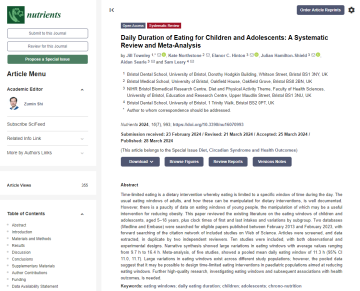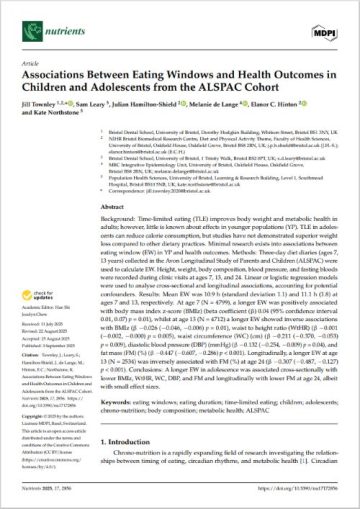Does time-restricted eating in children improve metabolic health?
Theme Diet and physical activity
Workstream Population diet and physical activity
Status: This project is ongoing
This project will explore whether time-restricted eating can improve metabolic health in children. Time-restricted eating involves eating all your meals during a specific time window without focusing on the number of calories you eat during that window. Metabolic health is a term we use to describe how well a person generates and processes energy in their body.
Project aims
- Establish average eating windows of children and adolescents
- Investigate associations between eating windows and metabolic health in children and adolescents
- Establish the feasibility of a time-limited eating intervention in UK children living with overweight or obesity
What we’ve done so far
Review of past studies
We carried out a systematic review of studies looking at time-limited eating in children. A systematic review analyses the evidence available on a specific topic. In this case we wanted to explore how long children and adolescents spent eating each day. This is called an ‘eating window’ and it is defined as the time between someone’s first and final meals of the day.
We found 10 studies that were eligible for our review. They looked at eating windows in 4,589 young people aged 6-20 years old and reported a wide range of eating window durations – from as short as 9.7 hours up to 16.4 hours per day.
On average, we calculated that children and adolescents were eating within a window of about 11.3 hours each day. Some of the studies we analysed suggested that eating windows tend to get longer as children get older, possibly due to staying awake later.
There was a lot of variation between studies, which could relate to different eating habits across cultures as well as how eating windows were measured. While an 11-hour average eating window seems long, our findings indicate time-restricted eating interventions aimed at reducing eating windows may be possible in young people.
However, more high-quality research is still needed in this area before any time-restricted eating programs could be recommended for children and adolescents. Future studies should focus on the potential links between eating windows and health in younger age groups.
Analysis of data from the Avon Longitudinal Study of Parents and Children (ALSPAC)
We analysed three-day diet diaries and clinical health measures from over 4,700 participants at ages 7 and 13, as well as more than 2,500 participants followed to age 24.
We found:
- At age 7, a longer eating window was associated with a higher body mass index z-score. A child’s body mass index z-score is a measure of how their body mass index differs from the average body mass index of a child of their age and sex. This finding suggests a small link between more extended eating and higher relative body weight in early childhood.
- At age 13, however, the pattern reversed: longer eating windows were associated with lower body mass index z-score, as well as:
- Lower waist-to-height ratio
- Smaller waist circumference
- Lower diastolic blood pressure (the lower of the two numbers in a blood pressure reading, representing the blood pressure in between heartbeats)
- Lower body fat percentage
- By age 24, those who had longer eating windows at age 13 showed lower body fat percentages, even more than a decade later.
Although the associations were modest, the findings suggest that rigid time-restricted eating may not always be beneficial for younger populations. However, further research is needed to fully understand these associations.
This PhD project is being undertaken by Jill Townley, as lead researcher, with Dr Sam Leary, Dr Kate Northstone, Dr Ella Hinton and Professor Julian Hamilton-Shield providing supervision.
What we hope to achieve
We hope to better understand whether time-limited eating in children and adolescents can affect body composition and metabolic health. This knowledge can then be used to guide future dietary interventions.

Daily Duration of Eating for Children and Adolescents: A Systematic Review and Meta-Analysis
